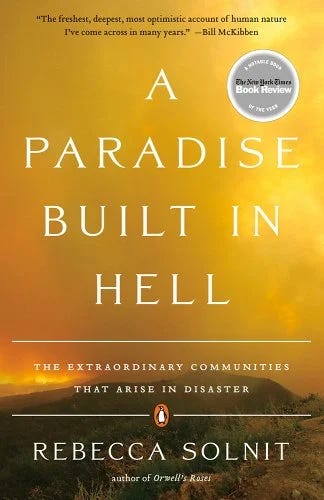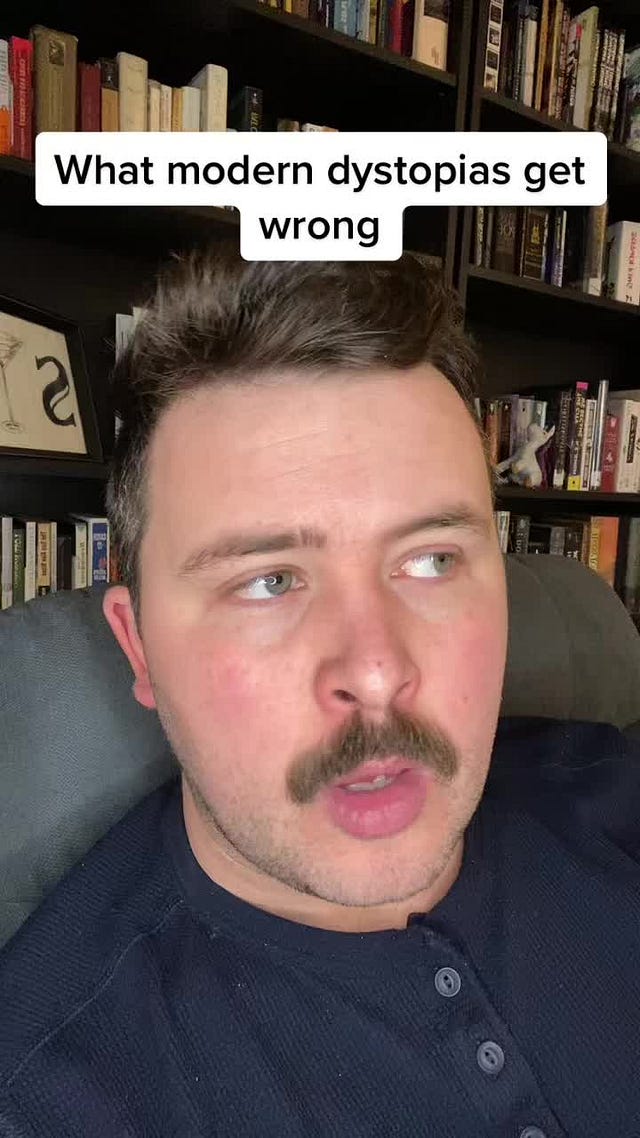Book Rex: A Paradise Built in Hell
A book on "disaster utopias" and what we get wrong about human nature
I was going to publish something different today, but then my video last week about disaster utopias on TikTok got a quarter of a million views in 24 hours, sooo… welcome new followers! For older followers, here’s the video:
That was a short video! I feel like delving into the book it was based on would be helpful for fleshing out some of the questions people had in the comments. So without further ado, let’s discuss Rebecca Solnit’s A Paradise Built in Hell.

Solnit’s book is based upon the work of “disaster studies” scientists. This field really took off during the Cold War, when the United States government realized it needed information on how people respond in the event of disasters, in case there was ever a nuclear war and they needed to restore order.
The post-WWII view of human nature was bleak. Which was understandable. We’d just been through two meat-grinder wars, we were uncovering the horrors of the Holocaust, new and terrifying forms of totalitarian government were arising in the forms of both fascism and Soviet-style communism, and the old empires were violently crumbling. Also, we seemed to be on the brink of literally destroying all life on earth.
But what people tended to do with this information was view it as an indictment of human nature rather than an indictment of power itself. The Holocaust could be chalked up to Original Sin and man’s dark nature, rather than to totalitarianism, racism, and mass propaganda.
What the findings of disaster studies showed was the opposite: when something terrible happened and order crumbled, people consistently, spontaneously organized to help each other out. The response was more or less instinctive, and did not require centralized organization.
Media myths in disasters
Solnit’s book looks at five separate disaster case studies and compares the similarities and differences: the 1906 San Francisco Earthquake, the Halifax munitions explosion of 1917, the Mexican Earthquake of 1986 (which resulted in the toppling of decades of one-party rule), 9/11, and Hurricane Katrina.
In each of these situations, spontaneous, decentralized disaster responses appeared. In the earthquakes and the explosion, people joined together to dig people out of the rubble and distribute food and water, in the hurricane and 9/11, people with boats spontaneously organized rescue crews.
The reason people think that there’s so much violence and chaos during these events is that the press usually tells them that this is what going on. Predictably, the first comment on my disaster video brought up the “rapes in the Superdome” after Katrina. It was worse than the commenter suggested: the reports, which were amplified by both the Mayor of New Orleans and the Chief of Police for the city, were that babies were being raped, and that at least one infant had its throat slit. Chris Kyle, the mass-murderer glorified in the book and movie American Sniper, reported that he camped on top of the Superdome to murder “looters” with his sniper rifle.
The problem is that there was no evidence that these stories were ever true. The press simply reported on rumors as if they were fact, without bothering to confirm them. While the disaster response in the Superdome was its very own disaster, there have never been any corroborated reports of rapes, and certainly none of infanticide, during the Superdome debacle. These stories were used as a justification for a mass police crackdown after the Hurricane, and were also used as an excuse for a sheriff in a nearby parish to basically tell his deputized (white) vigilantes that they could murder black people they saw fleeing the floods through their neighborhoods.
Maybe the third comment was from an actual Louisianan, who said that he’d lived there long enough to know that in a hurricane, help was not coming from the authorities, but rather from his neighbors and the “Cajun Navy.”
Reports of looting, disaster studies has consistently found, are over-reported, and often include people “looting” stuff like food. This is obviously unfair, as in a disaster, much of that food would spoil, and it makes perfect sense for people to requisition it so they don’t starve.
These exaggerated or totally fabricated horror stories are used by authorities as reasons they need to re-exert their authority and control over the situation, which often results in repression and violence not from ordinary people but from the state.
“Nasty, brutish, and short”
The powerful people in our society have always needed the threat of chaos and disorder to scare us into thinking we need them. And this is not to say there aren’t benefits to our current society — I enjoy quite a bit about modern civilization — but if the premise of our society is that, without benevolent rulers, life would be “nasty, brutish, and short,” as the pro-monarchy philosopher Thomas Hobbes said, then our society is built upon a lie.
None of this is to say humans aren’t capable of horrific acts of violence and cruelty. It’s just to say that these acts are often not expressions of our most basic human nature, but instead are a result of unequal power structures. A white man believes the black man coming down the street in the midst of a hurricane is coming to loot him because of what he’s seen on his TV, so he shoots him. The reasons behind this murder are racism and misinformation from the media and the police. Those are both expressions of power — not necessarily of human nature.
What this also shows us is that the way you behave is influenced by what you believe. If you believe people are untrustworthy and are coming to hurt you, you’re likely to stock up on guns and eventually hurt someone in an act of “self-defense.” But if you believe people are usually trying to help, then you’re more likely to pitch in yourself and try and be part of a collaborative solution.
The good news is that we know humans are social creatures, and have been self-organizing dynamic solutions to difficult problems since before we first stood erect. Some people like to argue that this is proof that humans are inherently communist, or that they are inherently anarchist. But it’s equally true that some humans have always organized power structures and hierarchies, have always engaged in competition.
Which makes the truth about human nature far more interesting: if we have communism and capitalism, anarchy and totalitarianism all within us, if there is no one way we inherently are, then it is all just a choice.
So tell me: which would you choose?





